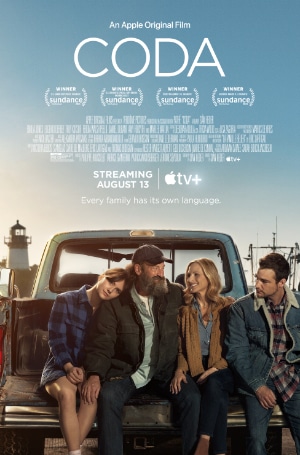Really good stories move me to tears touching me at a deep emotional level. And the Sundance breakout indie film CODA had me crying each time I’ve seen it. Put out by AppleTV+, this Siân Heder film draws on a familiar storyline with a unique twist. It centers on the one hearing member of a deaf family who finds her voice. Hence the name CODA (children of deaf adults). It delves into storytelling from the perspective of the Deaf community, using deaf actors for a more authentic presentation. Being a deaf actor in Hollywood, Marlee Matlin says, “deafness is not a costume that a hearing actor can put on to play a deaf role…. We are creating roles that tell it from our perspective,” which this film does brilliantly. Director/writer Heder comments, “Storytelling and movies are incredible tools for creating empathy. Nothing opens us more as a human [being] than feeling what it is to be in someone else’s shoes.” The core of the story centers on family, as Matlin responds in sign language, “It’s a deeply human story about the values of life and family…and is so true to life.” It’s a drama-comedy-romance all rolled into one emotionally-gripping story.
The film focuses on 17-year-old Ruby, brilliantly played by break-out artist Emilia Jones, the hearing member of the Rossi family. Learning sign language in 9 months-time and singing and acting all at the same time, says Jones, “taught me that I was a lot more resilient than I thought…. It allowed me to grow as a person…each skill was challenging in its own way.”
Ruby goes to high school while also helping her family in their Gloucester, MA fishing business. Every morning before school she goes out fishing on their boat with her father (Troy Kotsur) and brother (Daniel Durant) while also being the interpreter for business transactions, which her mother Jackie (Marlee Matlin) manages. The work is hard, and the pay is meager selling through distributors. The family constantly struggles to make ends meet as their earnings are minimized by higher taxes, nearly putting them out of business. Her brother Daniel believes they should start their own business where customers buy fish right off their boat. Together they make it happen. In between, Ruby goes to school.
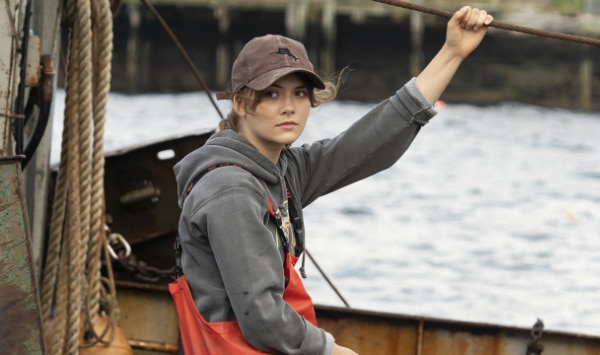
She is a shy girl that is often teased by the more popular students. Her best friend Gertie (Amy Forsyth) encourages her to sign up for some club at school. Ruby has doted on Miles (Ferdia Walsh-Peelo) from a distance and saw him join the choir, so she joins choir, never having sang before people in her life.
The choir master, Bernardo Villalobos (Eugenio Derbez), provides humor and artistic intensity to the film. His passion for music is palatable but he is also attuned to gifts in individual students. When Ruby is called on to sing something she runs out of the classroom, only to return later to ask him for a second chance. Teaching her singing skills, Bernardo finally hears a voice that astounds him. Answering her hesitancies, he responds with what people said about Bob Dylan, “a voice like sand and glue.” He continues, “There are plenty of pretty voices with nothing to say…. Do you have something to say?” He continues, “I’ll see you in class, Bob” referencing Dylan. Ruby accepts the challenge to discover her voice and Mr. Villalobos has her and Miles practice a duet for the school concert. Their sweet relationship blossoms.
Mr. Villalobos hears uniqueness in Ruby’s voice and asks her how she feels when she sings. She communicates back in sign language to her choir master, “I feel free.” Sign language, just like music, can express what may be inexpressible by words alone, adding a beauty and depth to this story. Bernardo offers to help her prepare for an audition for Berklee School of Music in Boston. Though Ruby objects saying she can’t afford school, he believes she can receive a scholarship. Personalized lessons are added to her already full schedule.
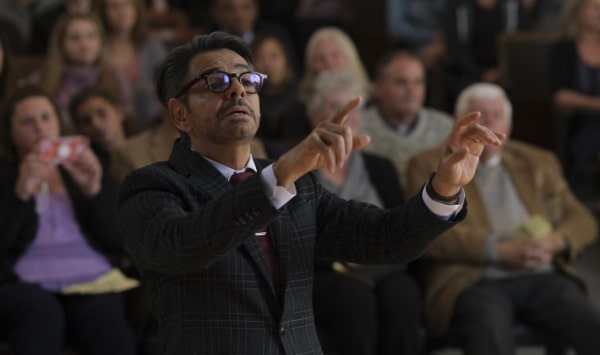
When federal investigators show up on the family fishing boat the day Ruby decides to skip work, misfortune strikes. Ruby finds herself in a dilemma. She wants to give time to her family to help them with the business, but she also wants to follow her dream in music, an ironic ability for a member of a deaf family. She signs to her parents, “I’ve been interpreting my whole life. This is exhausting! Singing is what I love. It’s everything!” Though they worry about her and how they will get by in a hearing world, they go to her school concert. When Ruby starts singing, they can’t hear but they see her perform. In an emotionally charged scene, all the sound drops out for the audience to experience the concert from their perspective and you catch a glimpse of what life is like for the deaf community. Yet, Matlin says that she hopes the audience of the film would, “appreciate another culture that has a deep history and embraces all aspects of humanity.” She hopes viewers would say, “It is no different than us, they are just people who don’t hear.”
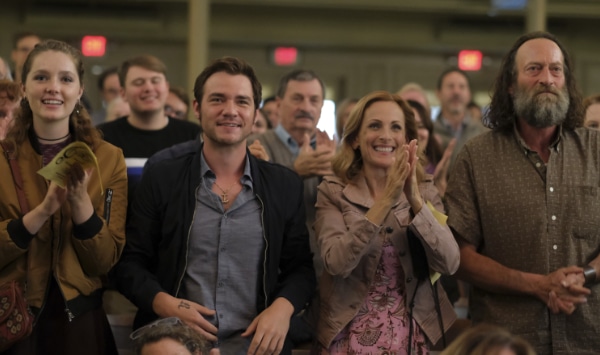
The part that had me crying almost uncontrollably is the scene after the concert when her dad signs to her asking what the song she sang was about. Ruby tells him it’s a song about what it means to need another person. He asks her to sing it for him, and as she does. He puts his hands on her throat to feel the vibrations. At that moment, the audience realizes it is family who helps her find her voice. Heder says of this scene, “When in a signed conversation you’re looking at each other…people are very connected…. [As a director, it’s about] getting out of the way and letting the language be the center.”
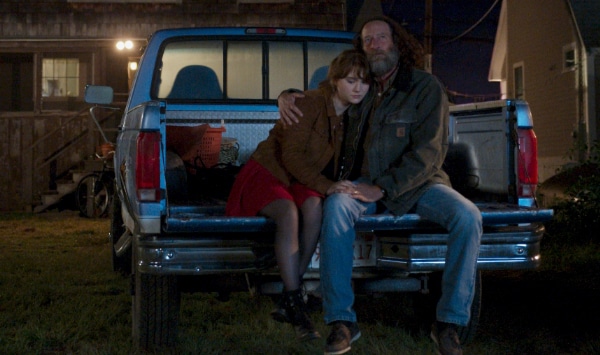
At once authentic and transformative, this film defies assumptions about the deaf community and their ability to not only get by but thrive in this world. It also sheds a light on the challenges of children of hearing adults and their struggles just like any child, to be close to the family while also seeking to find out who they are in this world. It’s a beautiful film about love, friendship, grace, and the bond of family that endures forever.
Though the film uses crass language, even in sign, and sexual situations and innuendoes, and would be more appropriate for older teens and adults, its profound messages offer something to reflect on when shared together. Even with all the messiness of life, the power of familial love endures.

